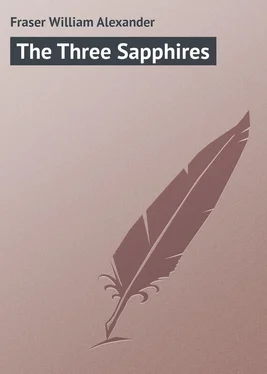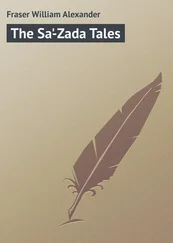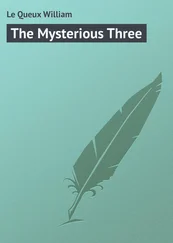William Fraser - The Three Sapphires
Здесь есть возможность читать онлайн «William Fraser - The Three Sapphires» — ознакомительный отрывок электронной книги совершенно бесплатно, а после прочтения отрывка купить полную версию. В некоторых случаях можно слушать аудио, скачать через торрент в формате fb2 и присутствует краткое содержание. Жанр: foreign_prose, Зарубежные любовные романы, на английском языке. Описание произведения, (предисловие) а так же отзывы посетителей доступны на портале библиотеки ЛибКат.
- Название:The Three Sapphires
- Автор:
- Жанр:
- Год:неизвестен
- ISBN:нет данных
- Рейтинг книги:4 / 5. Голосов: 1
-
Избранное:Добавить в избранное
- Отзывы:
-
Ваша оценка:
- 80
- 1
- 2
- 3
- 4
- 5
The Three Sapphires: краткое содержание, описание и аннотация
Предлагаем к чтению аннотацию, описание, краткое содержание или предисловие (зависит от того, что написал сам автор книги «The Three Sapphires»). Если вы не нашли необходимую информацию о книге — напишите в комментариях, мы постараемся отыскать её.
The Three Sapphires — читать онлайн ознакомительный отрывок
Ниже представлен текст книги, разбитый по страницам. Система сохранения места последней прочитанной страницы, позволяет с удобством читать онлайн бесплатно книгу «The Three Sapphires», без необходимости каждый раз заново искать на чём Вы остановились. Поставьте закладку, и сможете в любой момент перейти на страницу, на которой закончили чтение.
Интервал:
Закладка:
"No end of nerve; she almost deserves to preserve her incognito," Captain Swinton thought, remounting Shabaz.
On his way out the captain passed a heavy iron gate that connected the garden with the palace. And from beyond was now coming a babel of animal voices from the zoo. Mingling with the soft perfume of roses a strong odour of cooking curry reminded him of breakfast. At the gate he picked up his man, and, riding leisurely along, sought to learn from that wizened old Hindu the horsewoman's name.
There came a keen look of cautious concealment into the man's little eyes as he answered: "Sahib, the lady I know not, neither is it of profit for one of my labour to converse about fine people, but as to the grey stallion we in the stables allude to him as Sheitan."
"He jumps well, Radha."
"Ha, sahib; all that he does is performed with strength, even when he tore an arm out of Stoll Sahib – he of the Indigo."
"How comes the lady to ride such an evil horse?" the captain asked.
"The stallion's name is Djalma, sahib, which means the favour of sacred Kuda, but to the mem-sahib he comes from the maharani's stable, which is a different thing."
"To bring her harm, even as Stoll Sahib came by it?"
But Radha parried this talk of cause leading to effect by speech relating to Djalma. "It might be that the matter of Stoll Sahib's hand was but an accident – I know not; but of evil omens, as twisted in the hair of a horse, we horsemen of repute all know. The grey stallion carries three marks of ill favour. Beneath the saddle he has the shadow maker, and that means gloom for his owner; at the knee is a curl, with the tail of the curl running down to the fetlock – that means the withdrawal of the peg. That is to say, sahib, that his owner's rope pegs will have to be knocked out for lack of horses to tie to them."
"He seems a bad lot, Radha," Swinton remarked as the attendant stopped to pick a thorn from his foot.
"Worst of all," the little man added dolefully, "is the wall eye."
"Has the grey stallion that?"
A smile of satisfaction wreathed the puckered lips of Radha. "The sahib knows, and does the sahib remember the proverb?"
"That not one will be left alive in your house if you possess a horse with one white eye?" the captain said.
They now slipped from the hill road to the plain, and the Arab broke into a swinging canter.
The captain's breakfast was waiting, so was Gilfain and also – which caused him to swear as he slipped from the saddle – was Baboo Lall Mohun Dass.
In the genial morning sun the baboo looked more heroic in his spotless muslin and embroidered velvet cap sitting jauntily atop his heavy, black, well-oiled hair.
"Wanting to speak to master, sar, this morning," he said. "After debauch, in the morning wisdom smiles like benign god. I am showing to master last night property of maharajah, and he is terrible old boy for raising hell; I am hear the sahib will make call of honour, and, sar, I am beseeching you will not confide to his highness them peccadillos."
"All right, baboo. But excuse me; I've got to have a tub and breakfast."
When Lord Victor and Captain Swinton had finished their breakfast a huge barouche of archaic structure, drawn by a pair of gaunt Waler horses, arrived to take them to the maharajah. On the box seat were two liveried coachmen, while behind rode the syces.
As they rolled along the red road through the cantonments they overtook Baboo Mohun Dass plugging along in an elephantine strut beneath a gaudy green umbrella. When they drew abreast he salaamed and said: "Masters, kind gentlemen!" The coachman drew the horses to a walk, and the baboo, keeping pace, asked: "Will you, kind gentlemans, if you see a vehicle, please send to meet me? I have commanded that one be sent for me, but a humbugging fellow betray my interest, so I am pedestrian." His big, bovine eyes rested hungrily on the capacious, leather-cushioned seat alluringly vacant in the chariot.
"All right, baboo!" Then Swinton raised his eyes to the coachman, who was looking over his shoulder, and ordered: "Hurry!"
The big-framed, alien horses, always tired in that climate, were whipped up, and a rising cloud of dust hid the carriage from Baboo Dass' glaring eyes.
Indignation drove a shower of perspiration through the baboo's greasy pores. He turned toward the sal-covered hills, and in loud resentment appealed to Kali, the dispenser of cholera, beseeching the goddess to punish the sahibs.
Baboo Dass was startled by a voice, a soft, feminine voice, that issued from a carriage that had approached unheard. He deserted the evil goddess and turned to the woman in the carriage. She was attractive; many gold bangles graced her slender arms; on her fingers were rings that held in setting divers stones, even diamonds. A large mirror ring indicated that she was coquettish, and yet a certain modesty told that she was not from Amritsar Bazaar.
Her voice had asked: "What illness troubles you, baboo?"
Now, as he salaamed, she offered him a ride into Darpore town.
Baboo Dass climbed into the vehicle, expressing his gratitude, explaining, as they bowled along, that he was a man of affairs, having business with the maharajah that morning, and that by mischance he had been forced to walk. In reciprocal confidence the lady explained she was the wife of a Marwari banker.
The baboo's resentment welled up afresh; also a little boasting might impress his pleasing companion. "To think, lady," he said, "last night we are roystering together, those two sahibs, who are lords, and me, who am a man of importance in Hamilton Company, and now they are coming in the maharajah's carriage and they pass me as if I am some low-caste fellow in their own country that works with his hands."
"That is the way of the foreigners," the Marwari woman answered softly; "they will put the yoke on your neck and say 'Thank you.' On their lips are the words of friendship, in their hand is the knotted whip."
"When they see I am important man with his highness they will not feel so elegant."
"I will take you to the drawbridge where it crosses the moat to the gate in the big wall," the Marwari woman offered.
"It is undignified for a man of my importance to approach the palace on foot," declared Baboo Dass.
The Marwari woman smiled, her stained red lips parting mischievously. "But also, Baboo Dass, it would not be proper for you to arrive with me. I have a way to arrange it that will save both our good standing. We will drive to my place of banking, then my carriage will take you to the palace, and the sahibs will not see you walk in."
The baboo was delighted. In India opulent people did not call on rajahs afoot; also the carriage was a prosperous-looking vehicle, and the two country-bred horses were well fed.
As they neared the palace, that lay hidden behind massive brick walls, they left the main thoroughfare, and, after divers turnings, entered a street so narrow that their vehicle passed the mud-walled shops with difficulty. A sharp turn, and the carriage stopped in a little court.
Four burly natives rose up from the mud step on which they had been sitting, and, at a word from the Marwari woman, seized her companion. The baboo struggled and sought to cry out for help, but the lady's soft hand deftly twisted a handkerchief into his mouth, hushing his clamour. He was torn from the carriage none too gently, hustled through an open door, and clapped into a chair, where he was firmly held by his four attendants.
A little old man seized a cup wherein was a piece of soap, and with his brush beat up a lather, saying softly: "Do not struggle, baboo; it is for your good. These fevers burn the liver and affect the brain; in no time I will have taken the accursed fever from your head."
Then with a scissors he nimbly clipped the profuse locks of the baboo's head, the latter, having managed to spit out the handkerchief, protesting that it was an outrage, that he was a jewel merchant from Calcutta waiting upon the rajah.
Читать дальшеИнтервал:
Закладка:
Похожие книги на «The Three Sapphires»
Представляем Вашему вниманию похожие книги на «The Three Sapphires» списком для выбора. Мы отобрали схожую по названию и смыслу литературу в надежде предоставить читателям больше вариантов отыскать новые, интересные, ещё непрочитанные произведения.
Обсуждение, отзывы о книге «The Three Sapphires» и просто собственные мнения читателей. Оставьте ваши комментарии, напишите, что Вы думаете о произведении, его смысле или главных героях. Укажите что конкретно понравилось, а что нет, и почему Вы так считаете.












